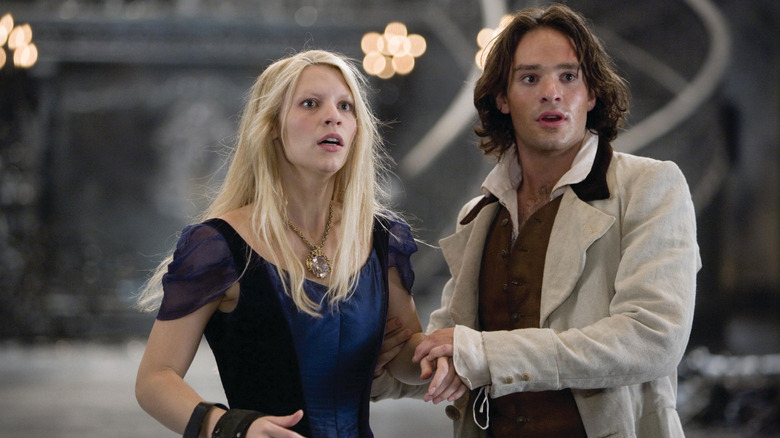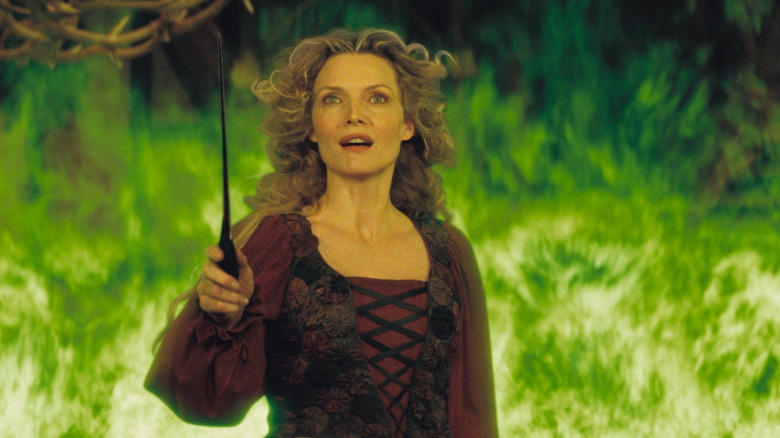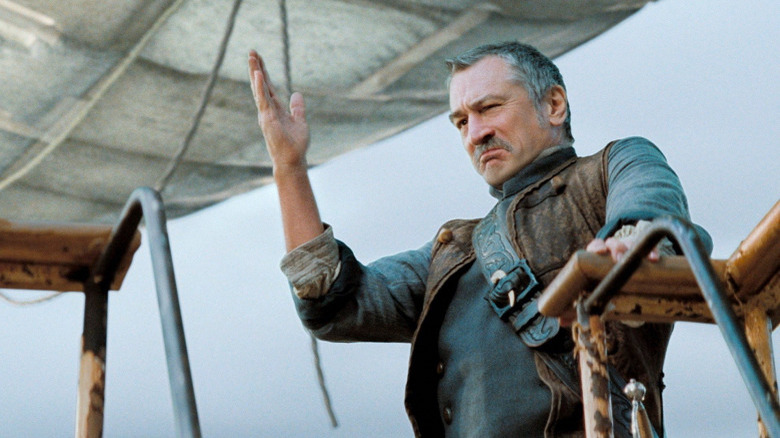Stardust Borrowed Its Structure From A Very Different Robert De Niro Film
Neil Gaiman's writing (be it his short stories, novels, or comic books) is often as weird and whimsical as it is scary and melancholy. It's the multi-hyphenate's ability to effortlessly blur the lines between genres and tones that makes his work tricky to adapt, even in the cases where all involved parties are on the same page creatively. But where animation can ebb and flow stylistically the way Gaiman's written word does, that's harder to manage in live-action.
Perhaps that's why Matthew Vaughn's "Stardust" remains one of the best non-animated projects based on Gaiman's writing 15 years after its release in 2007, even with the uptick in Gaiman adaptations since then. Rather than trying to capture the many different facets of Gaiman's original 1999 novel, Vaughn's film jettisons most of its source material's pathos and edge in favor of playing up the sillier aspects of the story. And rest assured, there is plenty of humor to be found in a movie crossing a rom-com with a road trip adventure and a cheeky post-modern fairy tale in the vein of "The Princess Bride."
In an interview with Ain't It Cool News in 2007, Vaughn cited the merging of genres as the thing he liked the most about Gaiman's book, stating, "The weird thing is — and you may think I'm insane for thinking it — but, I read it thinking, God, for me, I could make a 'Princess Bride' with a 'Midnight Run' on the tone." He went on to explain how "Stardust" is "virtually identical" to "Midnight Run" so far as the structures of their plots are concerned.
So what happens in Stardust again?
As with most Neil Gaiman stories, "Stardust" — which Matthew Vaughn directed and co-wrote with his writing partner Jane Goldman — takes place in a setting where the realm of magic lies just beyond the periphery of the everyday world. Quite literally, in this case, the kingdom of Stormhold (home to witches, unicorns, and more) is separated from the quaint English village of Wall, which is, ahem, very imaginatively named for the ancient stone wall that lies between them.
Charlie Cox, back in his days before playing The Man Without Fear, stars in Vaughn's film as Tristan Thorn, a naive young man who crosses into Stormhold to retrieve a fallen star for his would-be lover, Victoria Forester (Sienna Miller), in exchange for her hand in marriage. Having definitely thought this highly sensible plan through, Tristan is surprised to discover the star has taken on the form of Yvaine (Claire Danes), a young woman who is none too keen on being dragged to Victoria after Tristan uses a magical chain to ensure she comes along with him.
Over the course of their journey, Tristan and Yvaine are hunted by a pack of witches led by Lamia (Michelle Pfeiffer), who intend to cut out Yvaine's heart and consume it to restore their youth and abilities. Also hot on the heroes' tails are a group of princes, all of whom seek a gem that, as fate would have it, was responsible for knocking Yvaine out of the sky in the first place and now lies around her neck. Finally, there's Captain Shakespeare (Robert De Niro), the commander of a flying pirate ship who gives Tristan and Yvaine a lift at one point during their trek.
Think of Claire Danes as Charles Grodin
Robert De Niro's casting as Captain Shakespeare — a pirate lord who projects gruffness but is secretly flamboyant and queer-coded — is a knowing subversion of the hyper-masculine, tough guy roles he played in Martin Scorsese's mobster dramas "Goodfellas" and "Casino," as well as Martin Brest's 1988 action-comedy "Midnight Run." For those not familiar, De Niro stars in Brest's film as Jack Walsh, a bounty hunter hired by a Los Angeles bail bondsman to capture Jonathan "The Duke" Mardukas (Charles Grodin), a mild-mannered accountant who stole money from the Chicago mob. Upon finding "The Duke" hiding in New York, Jack has but five days to return him to L.A. before either the FBI or the mafia can get to him.
Speaking to AICN, Matthew Vaughn recalled how he broke down the structural parallels between "Stardust" and "Midnight Run" for an understandably perplexed De Niro:
"I remember saying it to Bob, and Bob said, 'So, what is this movie like?' and I said, 'Well, it's going to be a bit like Midnight Run.' And, he looks at me, like, 'Wha-a-at?' And, then I explained. The analogy is that if you think Charles Grodin is [Yvaine], Tristan is De Niro's role, right? They're trying to get back to the bail bond... and the mob are the witches, and the FBI are the princes."
"Midnight Run" might not be an obvious inspiration for "Stardust" the way "The Princess Bride" is, but the pair do very much share the same buddy road trip movie DNA. Moreover, for as much as Vaughn's film deviates from Neil Gaiman's source material in terms of its tonal elements, the way it mixes disparate genres makes it far more faithful to the spirit of Gaiman's work than it may seem at a passing glance.


